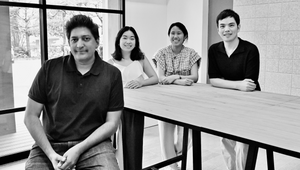
DDB Singapore Creates App to Help Parents Connect with Their Autistic Children

Studies that have shown that children with autism struggle with social interaction but like to interact with digital devices. How do we turn their love for digital devices into an opportunity for learning?
DDB Singapore together with Genesis School for Special Education launched Face 2 Face – a mobile application that encourages interaction and parent-child bonding while assisting in the improvement of literacy skills.
The opportunity came about when we noticed that out of the therapist’s clinic, many parents need handles on teaching social skills to their children with autism. At home, they find it hard to vie for attention with digital devices that are filled with single-user apps that keep the children to themselves.
After months of research and experimentation, as well as expert content input from Alison Cheng, Psychologist, Child Development Unit (CDU), National University Hospital, Face 2 Face was born.
While using digital devices as a learning tool for children with autism is not new, the Face 2 Face app is unique from other apps in these ways:
It’s a 2-way, 2-user app
The most distinct feature in Face 2 Face is the Mirror Keypad – an original user interface that allows parent and child to sit face to face while using the app. The Mirror Keypad makes it intuitive for the child to look up into the parent’s face, hence enabling the child to interact not just with the device but with the parent at the same time.
It allows personalisation
Children with autism respond better to objects they are familiar with. The Face 2 Face app allows the parent to input their own list of words and corresponding pictures, making it easier for the children to understand and learn the words.
It reminds you to interact
Voice and visual prompts have been programmed to appear when the child needs help, as a reminder for both parent and child. The prompts urge the child to ask for help and the parent to encourage the child to do so.
It tracks progress
The app records the results each time an exercise is completed. It then maps the results into a simple graph that allows parents to monitor the child’s progress.
“We believe that barriers can be broken when creativity, technology and data come together. And we are truly humbled and honoured for this opportunity to use our creativity and expertise in such a meaningful way,” said Chris Chiu, Group Chief Creative Officer, DDB Singapore.
“There are many apps marketed to improve educational outcomes, but few have actual physical social interaction as its primary focus. This app will further empower parents to stand alongside professional caregivers in improving their children’s social skills.” said Benjamin Kwek, Principal, Genesis School of Special Education.
“Contributing to the development of this app has been a great opportunity, allowing us to harness new media as a platform with which we may continue to empower parents in engaging and teaching their children, as well as educating others about the developmental challenges that children may face,” said Alison Cheng, Psychologist, CDU, National University Hospital.
Face 2 Face is free for download on the App Store by Apple. It is compatible with iPad devices running iOS 11 or later.















